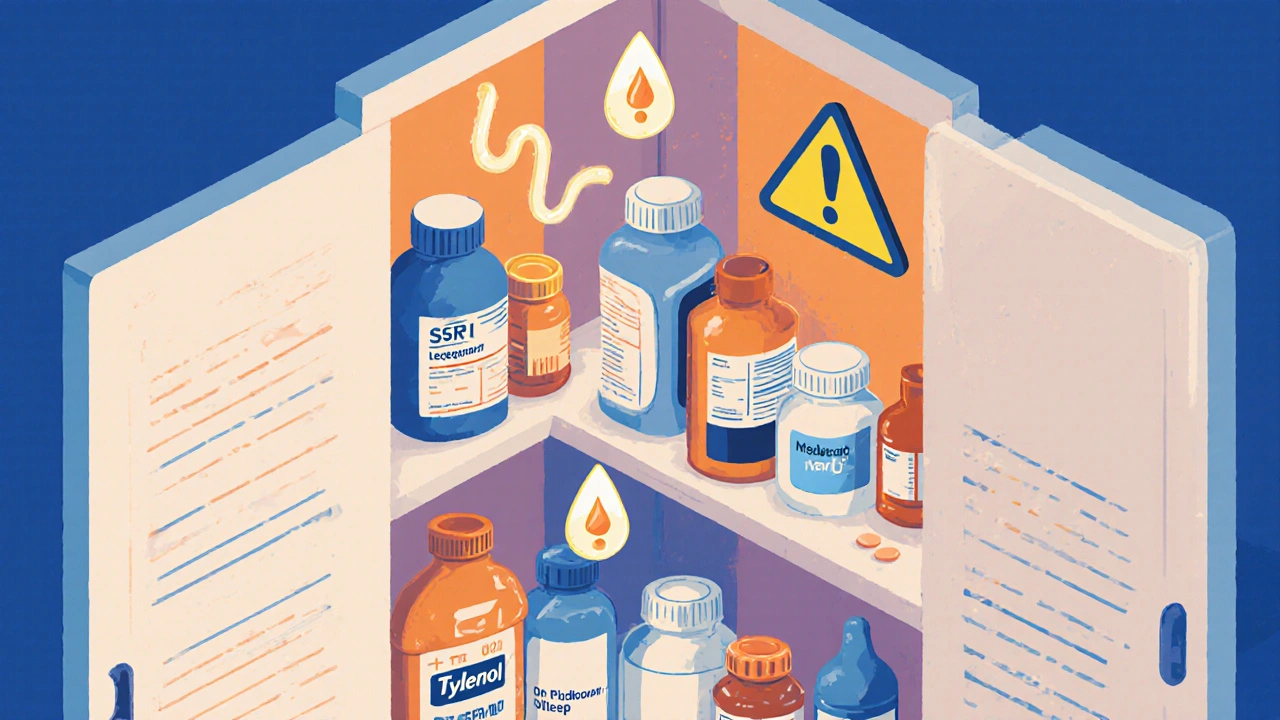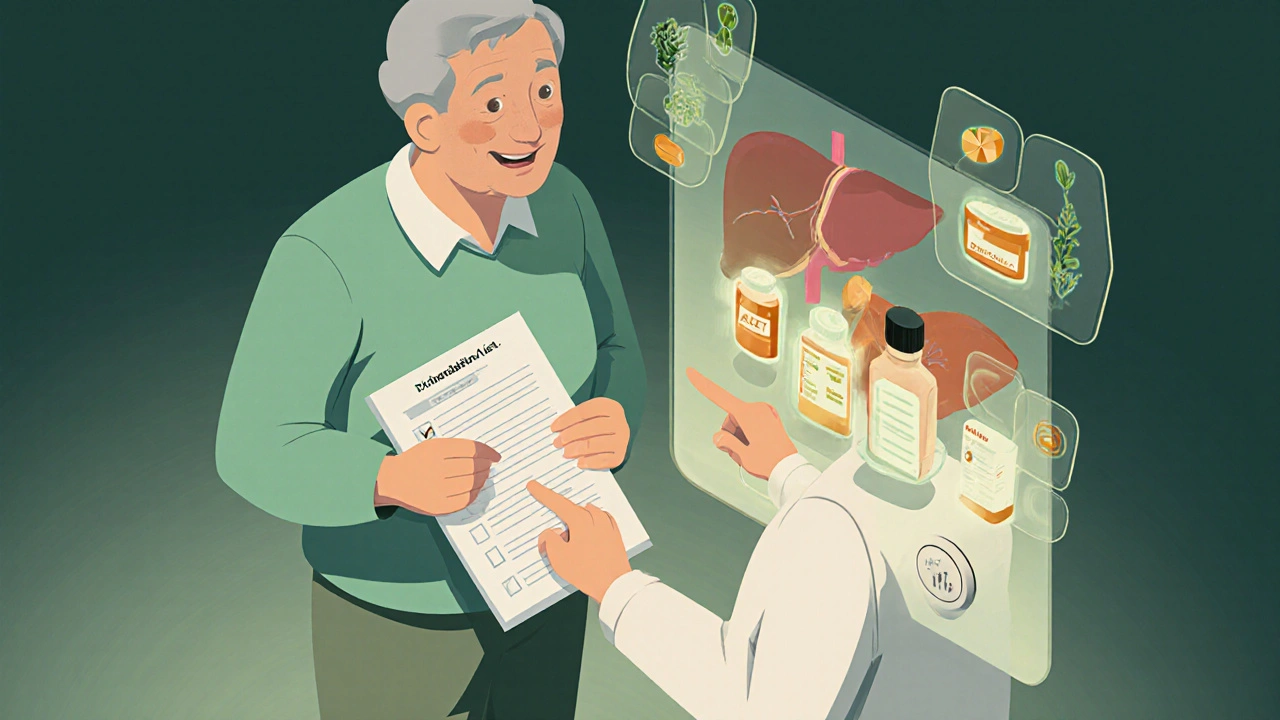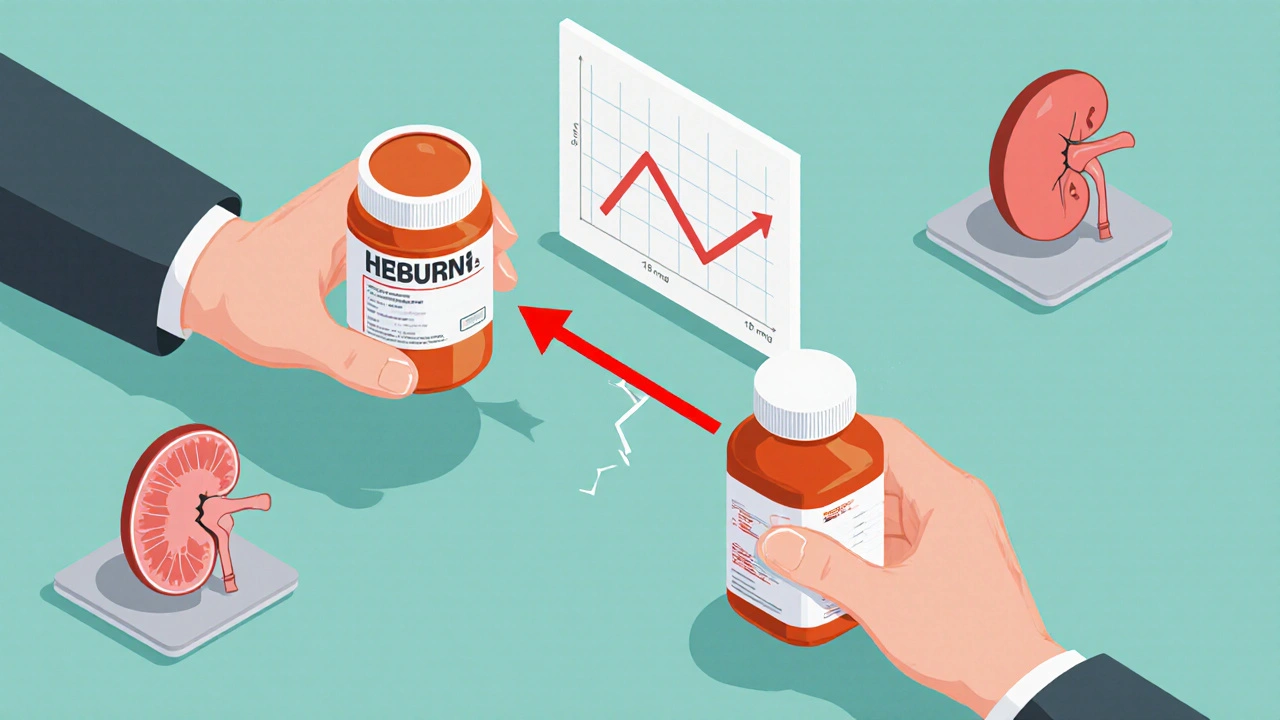Every year, millions of people mix over-the-counter (OTC) meds with their prescription drugs without thinking twice. A cold pill here, an antacid there, a pain reliever for that backache - it all seems harmless. But what if that little bottle of ibuprofen is quietly canceling out your blood pressure medicine? Or if the sleep aid you took last night is making your antidepressant dangerously strong? These aren’t rare accidents. They’re common, preventable, and sometimes deadly.
Why OTC Medications Are Riskier Than You Think
Most people assume OTC means safe. After all, you can buy them without a prescription. But that’s exactly the problem. OTC drugs aren’t harmless snacks. They’re powerful chemicals with real effects on your body - and they don’t play nice with everything else you’re taking. Take acetaminophen, the active ingredient in Tylenol, Excedrin, and dozens of cold and flu products. It’s safe when taken alone at the right dose. But if you’re also taking a prescription painkiller that contains acetaminophen - like Vicodin or Percocet - you could easily hit the 4,000 mg daily limit without realizing it. Exceeding that can cause sudden, irreversible liver failure. One study found that nearly half of all acetaminophen overdoses are accidental, not intentional. People just didn’t know they were doubling up. Then there’s ibuprofen and naproxen. These NSAIDs are common for headaches, menstrual cramps, or arthritis. But if you’re on aspirin to protect your heart, taking ibuprofen can block aspirin’s antiplatelet effect. That means your blood isn’t getting the thinning protection it needs. For someone with a history of heart attack or stroke, that’s a ticking time bomb.The Top 5 Dangerous Combinations You Must Avoid
Not all interactions are obvious. Here are the five most dangerous ones you need to watch for:- NSAIDs + Blood Pressure Medications - Ibuprofen, naproxen, or even high-dose aspirin can make drugs like lisinopril, amlodipine, or hydrochlorothiazide less effective. Your blood pressure might creep up by 5 to 15 mmHg - enough to increase your risk of stroke or heart failure.
- SSRIs + NSAIDs or Dextromethorphan - If you’re on an antidepressant like sertraline or fluoxetine, mixing it with ibuprofen raises your risk of stomach bleeding by 3 to 10 times. Combine it with cough syrup containing dextromethorphan, and you could trigger serotonin syndrome - a life-threatening surge in serotonin levels that causes confusion, rapid heartbeat, and muscle rigidity.
- Levothyroxine + Proton Pump Inhibitors - Omeprazole (Prilosec) or esomeprazole (Nexium), taken for heartburn, can reduce how much thyroid medication your body absorbs. That means you might feel tired, gain weight, or have cold intolerance - not because your condition is worsening, but because your pill isn’t working.
- Anticoagulants + NSAIDs or Herbal Supplements - Warfarin, apixaban, or rivaroxaban are used to prevent clots. But adding ibuprofen, naproxen, or even garlic supplements can turn your blood into a leaky hose. Bleeding in the brain, stomach, or intestines becomes far more likely.
- Antacids + Digoxin or Antibiotics - Aluminum- or magnesium-based antacids like Maalox or Mylanta can bind to digoxin (used for heart rhythm issues) and cut its absorption by up to 25%. Same goes for some antibiotics like tetracycline. You might think the medicine isn’t working - but it’s your antacid blocking it.
What You’re Not Telling Your Doctor (And Why It Matters)
A WebMD survey found that 67% of people never mention their OTC meds to their doctor. Why? They think it’s not important. Or they forget. Or they assume the doctor already knows. But here’s the truth: doctors don’t ask about every OTC pill you take. They assume you’re only on what’s written in your chart. And most charts don’t include that bottle of melatonin you started last month, or the zinc lozenges you take every cold season, or the magnesium supplement for leg cramps. That’s a huge blind spot. A 2021 study showed that nearly 20% of hospital admissions due to drug interactions involved OTC medications that weren’t documented in the patient’s medical record. Elderly patients on five or more prescriptions are especially at risk. One man in his 70s ended up in the ER after falling - not because he was dizzy, but because his nighttime sleep aid (diphenhydramine) mixed with his prescription anxiety med caused severe drowsiness. He didn’t think to mention the sleep aid because it was “just OTC.”
How to Check for Interactions - A Simple Step-by-Step Guide
You don’t need to be a pharmacist to protect yourself. Here’s how to check for dangerous interactions before you take anything new:- Make a full list - Write down every prescription, OTC, vitamin, mineral, and herbal supplement you take. Include the dose and why you take it. Don’t skip the “just once in a while” meds - like that ibuprofen for your knee or the antacid after spicy food.
- Check the active ingredients - Read the “Drug Facts” label on every OTC box. If two products list the same ingredient (like acetaminophen or pseudoephedrine), don’t take them together.
- Use a trusted checker - Go to WebMD’s Drug Interaction Checker or the FDA’s OTC Medication Safety page. Type in your prescription and the OTC drug. It will flag risks like bleeding, kidney strain, or serotonin overload.
- Ask your pharmacist - Pharmacists see hundreds of these combinations every week. When you pick up a new prescription, ask: “Could this interact with anything I’m already taking - even stuff I bought myself?”
- Update your list monthly - Your meds change. So should your list. Keep it in your phone or wallet. Bring it to every doctor visit.
Special Risks for Older Adults and Chronic Illness
If you’re over 65, have kidney disease, liver problems, heart failure, or diabetes, your body handles drugs differently. That makes interactions more likely - and more dangerous. For example:- Older adults are more sensitive to the sedative effects of antihistamines like diphenhydramine. Combined with sleep aids or pain meds, this can cause falls, confusion, or urinary retention - especially if you have an enlarged prostate.
- People with kidney disease should avoid sodium phosphate laxatives (like Fleet Enema). These can cause acute phosphate nephropathy - a sudden, severe kidney injury - especially when taken with diuretics or blood pressure drugs.
- Those on blood thinners should avoid turmeric, ginger, or ginkgo supplements. These aren’t “natural” in the safe sense - they thin your blood too.

What to Do If You’ve Already Mixed Them
If you’ve taken an OTC drug with your prescription and feel off - dizzy, nauseous, unusually tired, confused, or bleeding more than normal - don’t wait. Call your doctor or pharmacist right away. If symptoms are severe (chest pain, trouble breathing, fainting, black stools), go to the ER. Don’t stop your prescription meds on your own. That can be just as dangerous. Instead, write down what you took, when, and how you feel. Bring that list to your provider.Final Rule: When in Doubt, Pause and Ask
There’s no shame in asking. No matter how simple the OTC drug seems - whether it’s a sleep aid, a cough syrup, or a daily vitamin - if you’re on a prescription, treat it like a potential hazard. The FDA and CDC both say: Always check with a healthcare professional before combining OTC and prescription drugs. The truth is, you’re not alone. Millions of people do this every day without realizing the risk. But now you know. And knowledge is the best protection you have.Can I take ibuprofen with my blood pressure medicine?
It depends. Ibuprofen and other NSAIDs can reduce the effectiveness of blood pressure medications like lisinopril, metoprolol, or hydrochlorothiazide. They can also raise your blood pressure by 5-15 mmHg and increase your risk of kidney damage. If you need pain relief, acetaminophen is usually safer - but check with your doctor first, especially if you have kidney disease or heart failure.
Is it safe to take Tylenol with my antidepressant?
Acetaminophen (Tylenol) is generally safe with most antidepressants, including SSRIs like sertraline or escitalopram. Unlike NSAIDs, it doesn’t increase bleeding risk. But be careful not to exceed 3,000-4,000 mg per day. Many cold and flu products also contain acetaminophen, so always check the label to avoid accidental overdose.
Why do OTC labels not warn me about interactions?
OTC labels focus on common side effects and dosage limits, not every possible drug interaction. While the FDA now requires clearer warnings for high-risk products (like NSAIDs and acid blockers), many labels still don’t mention interactions with specific prescriptions. That’s why you can’t rely on the bottle alone - you need to check with a pharmacist or use a drug interaction tool.
Can vitamins and supplements interact with prescription drugs?
Yes. Calcium and iron supplements can block absorption of thyroid medication (levothyroxine) and antibiotics like tetracycline. Magnesium and zinc can interfere with some diuretics and osteoporosis drugs. Even common ones like vitamin K can reduce the effect of warfarin. Always list supplements on your medication list - they’re not harmless.
What should I do if I accidentally take two meds that interact?
Don’t panic, but don’t ignore it. Write down what you took, when, and how you’re feeling. Call your pharmacist or doctor immediately. If you have symptoms like chest pain, confusion, bleeding, trouble breathing, or fainting, go to the emergency room. Never stop your prescription without medical advice - that can cause its own risks.
Staying safe isn’t about avoiding OTC meds entirely. It’s about being smart. Keep your list updated. Ask questions. Check before you take anything. Your body will thank you.
